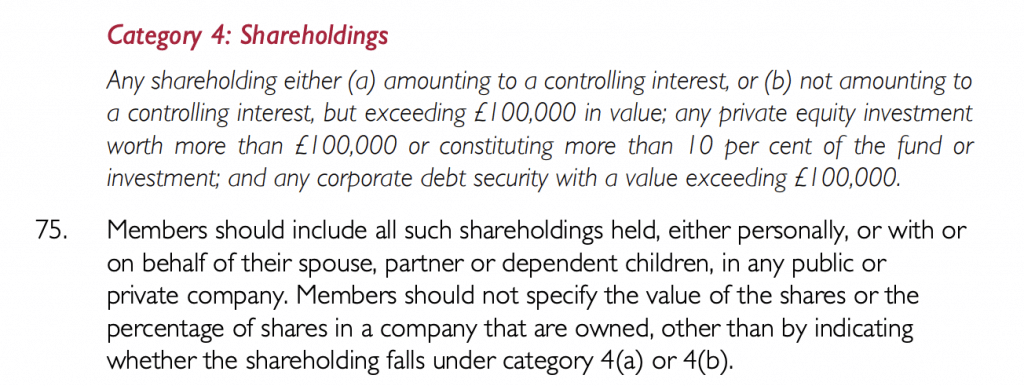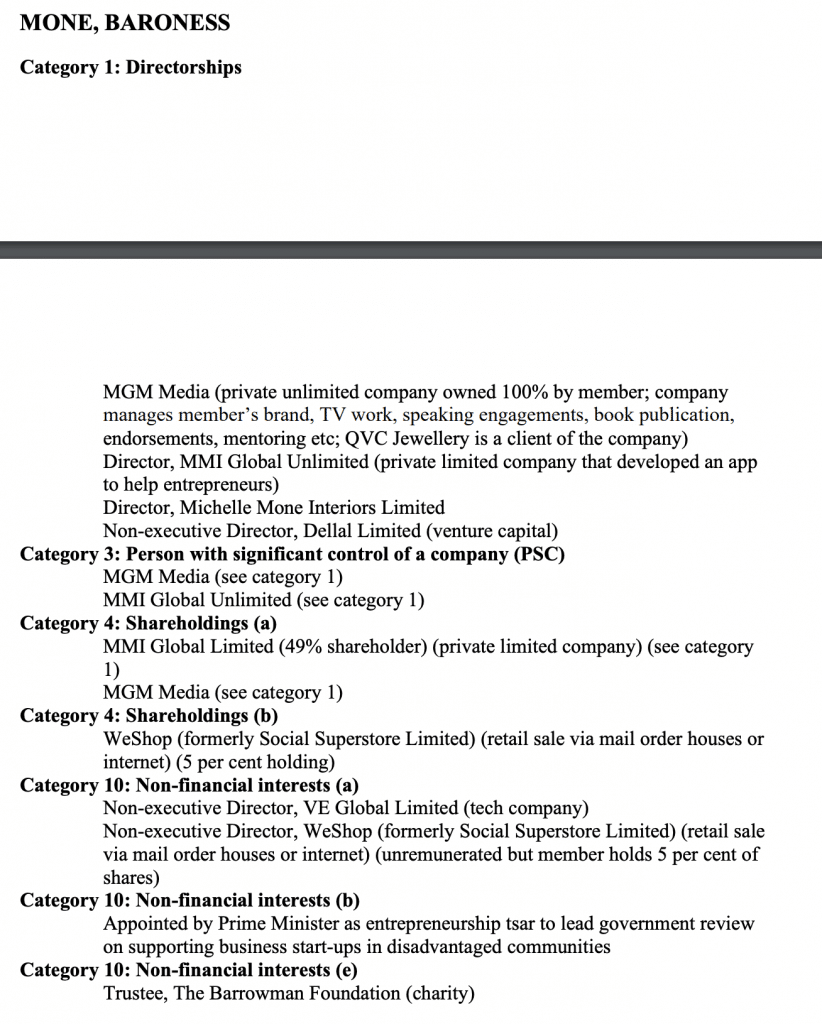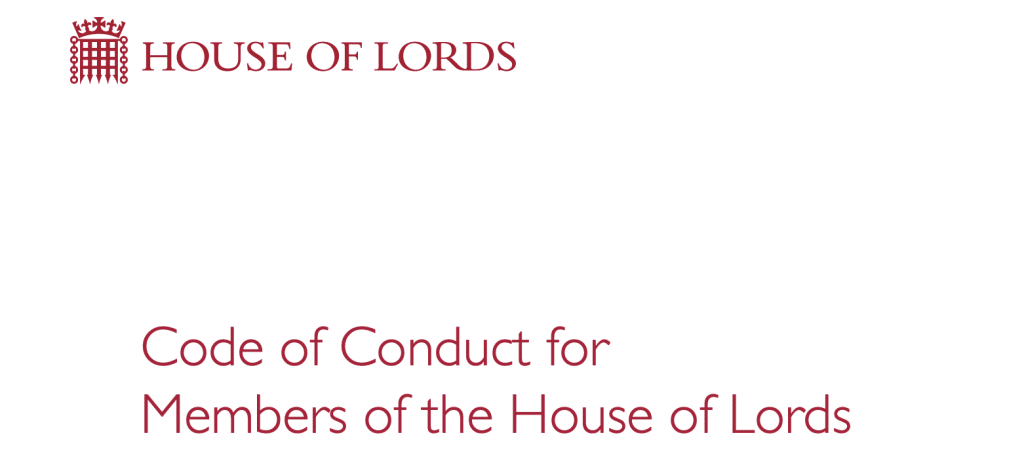Last year, the Times and then The Daily Mirror reported that Douglas Barrowman and Michelle Mone owned (and sometimes lived in) a house in Belgravia which was held by an offshore trust. The Times has reported that Barrowman sold the house earlier this year for £19m.
We’ve demonstrated that the trust and its trustees are likely controlled by Mone and/or her husband, Douglas Barrowman, but that they unlawfully failed to disclose their ownership at Companies House.
Given Mone had use of the house on multiple occasions, she must have been a beneficiary of the trust (as otherwise the trustees would have been in breach of trust).1The position would be different if Mone was the spouse of a beneficiary, but for the most of the relevant period they were not married (they married in November 2020)
The House of Lords rules require Members to declare any interest in a trust, just as they are required to declare interests in companies:



…



The value of Mone’s interest will exceeds £100,000 in value (it would cost that much to rent the house for just a few weeks).
Here’s how Baroness Mone discloses the trust in her entry in the April 2022 House of Lords register of Members’ interests (click to expand):2After that she took leave from the House of Lords, and no longer has to maintain the register. The house was acquired by the trust in 2015.



Nothing.
Another rule broken.
Thanks to K for the advice on House of Lords rules and J for the trusts advice.
-
1The position would be different if Mone was the spouse of a beneficiary, but for the most of the relevant period they were not married (they married in November 2020)
-
2After that she took leave from the House of Lords, and no longer has to maintain the register. The house was acquired by the trust in 2015.


4 responses to “Michelle Mone failed to declare her interest in an offshore trust”
I have worked in many developing countries in several parts of the world, spanning three continents in rule of law and governance. All too often the comments by my fellow team members was “ we may not achieve that much here as they are endemically corrupt” I would often answer and Britain is not?
Monarchy, honours, public schools and certain universities seem to inculcate a certain undeserving privilege in the few. Corrupt? Certainly!
Hi Richard,
Pray tell, what in this Tory parties years of being in government has led you to believe they are the party of law and order, especially when it comes to one of their own…just asking for a friend?
It is sweet anyone believes a politician, yet alone this government has the slightest interest in sleaze.
Regarding stripping her of her title I quote from the Lord’s library and feel free to ask Lord Ahmed or Archer how easy it is stripping someone convicted of a crime (and bare in mind Mone is currently innocent and has not been convicted of a crime);
“A peerage can only be removed by an act of parliament. The most recent act that did this was the Titles Deprivation Act 1917 (TDA).
The TDA received royal assent on 8 November 1917. It was used to remove British peerages from “enemies” of the UK during the First World War. Specifically, section one introduced powers to remove a peerage from anyone who had “during the present war, borne arms against His Majesty or His Allies, or who have adhered to His Majesty’s enemies”.
The act meant that any peer suspected of assisting the enemy could be investigated by a committee of the privy council who would then lay a report in both Houses of Parliament for 40 days. If this period elapsed without either House tabling a motion disapproving the report, the report would be taken as final and presented to the monarch. The peer would then be struck off the peerage roll and would have all rights to receive a ‘writ of summons’ and sit in the House of Lords removed. The writ of summons is the mechanism by which an eligible peer takes up their seat in the House of Lords. The TDA also meant that the rights to any peerage title would be removed.
On 28 March 1919, the London Gazette published the names of four people who had their peerages removed under the Titles Deprivation Act 1917:
Leopold Charles, Duke of Albany, Earl of Clarence and Baron Arklow;
Ernest Augustus, Duke of Cumberland and Teviotdale, Earl of Armagh;
Ernest Augustus, Duke of Brunswick, Prince of Great Britain and Ireland; and
Henry, Viscount Taaffe of Corren and Baron of Ballymote.
The TDA still remains in force to date. However, as the act refers specifically to the First World War, it is unlikely that its provisions could be used today.
Has any recent legislation been introduced to remove peerages?
No new laws to remove peerages have commenced since the TDA. However, several acts of parliament have been introduced to cancel or suspend a person’s membership of the House of Lords in certain circumstances.
For example, the House of Lords Reform Act 2014 ensures that a member convicted of a serious offence will cease to be a member of the House. A ‘serious offence’ means a criminal offence where the member has been sentenced for one year or more, or ordered to be detained indefinitely. ‘Ceasing to be a member’ means that the person is disqualified from attending House proceedings and is no longer entitled to receive a writ of summons, nor can they attend in pursuance of a writ already received. However, their peerage title remains.”
Hope above clarifies the great democracy that is the British Parliamentary system.
More excellent work holding those in power to account. The rules are there for all of us, not just the entitled few.
Thank you for your continuing work Dan
One would expect a government/Party that upholds to rule of law to be all over this: taking public and clear steps to
– strip her of honours
– suspend her from the Party
until she is found innocent or guilty and the full facts are confirmed in a court of law.
Were an innocent person in her shoes, they would resign until they cleared their name.
What will actually happen with this “drowning in sleaze” government?
I’m not holding my breath.
An impartial bystander might conclude they don’t care at all, and that their ethical code is “whatever they can get away with”.